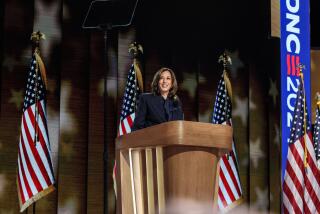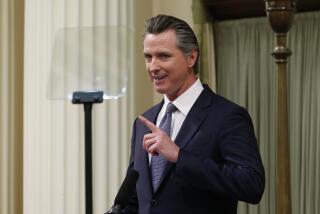Gov. Bush Repledges Allegiance to Texas, at Least for Time Being
- Share via
AUSTIN, Texas — George W. Bush was sworn in for his second term as Texas governor Tuesday, even as sources close to him signaled that he was increasing his efforts to explore a possible bid for the 2000 Republican presidential nomination.
Facing south from the imposing state Capitol building--but at least partly looking toward Washington--Bush delivered a well-received speech that could preview many potential themes of a campaign for the White House.
While the focus Tuesday was on the second term that Bush won in a landslide in November, many here viewed the day’s festivities as only the overture for a presidential announcement later this year. Aides said that, perhaps as soon as March, Bush could move closer to such a race by formally establishing a presidential exploratory committee.
“In March or so, if the answer [about running] is anything other than absolutely not, he’s got to let something go forward,” said one senior advisor to Bush, who has emerged as the clear front-runner in almost all early polls of GOP presidential preferences for 2000.
Bush advisors caution that an exploratory committee would reflect only a commitment to seriously examine a possible race--not an irrevocable commitment to run. But the assessment in political circles here is virtually unanimous: While it remains possible that Bush won’t run (he said Monday his wife remains “reluctant”), all signs now point toward his entering the race.
If he does, Bush likely would declare his intentions toward the end of the state legislative session in May or June, with a formal announcement to follow in summer or early fall.
In Tuesday’s inauguration speech, Bush built his remarks around the same trinity of ideas that have powered almost all of President Clinton’s major addresses: the need to expand opportunity, demand individual responsibility and nurture a sense of community across racial lines. But Bush reflected those ideas through a Republican prism by emphasizing low taxes, limited government and moral renewal as keys to social and economic progress.
“Societies are renewed from the bottom up, not the top down,” Bush, 52, told a crowd of thousands that included his parents, former President Bush and former First Lady Barbara Bush. “This renewal will continue if government respects individuals, does not tax them too much and does not try to do for them what they ought to do for themselves.”
Yet against those tributes to the classic GOP priority of small government, Bush balanced an emphatic reaffirmation of his own distinctive message of “compassionate conservatism.” The governor, who has sought to transfer more authority for social programs to religiously based charities, said Texas “must rally the armies of compassion in every community,” as well as expand educational opportunity for all children.
“We must not become two societies: one that believes in the American dream and one without such hope,” Bush said.
Although he made no direct comment about the impeachment struggle consuming Washington, Bush offered one observation that seemed aimed at Clinton’s problems. “Some people think it’s inappropriate to make moral judgments anymore. Not me,” he said to ringing applause.
Amid the speculation about his intentions for 2000, Bush has been quietly conducting a Jet Age version of the “front-porch campaign” most famously employed by William McKinley to win the presidency in 1896. Apart from two visits to Washington, Bush said, he is planning no campaign-style travel until the Texas legislative session ends.
But Bush has begun to meet with potential supporters who make the trek to Austin to see him--on his front porch, as it were. In the last several months, Bush has met more than a dozen times with fund-raisers from such high-dollar states as California, New York, New Jersey and Illinois, with a delegation from Florida expected Thursday.
For more than a year, he has also met with policy experts, including such neoconservative theorists as author Myron Magnet and sociologist James Q. Wilson, whose ideas Bush has used in devising his state agenda. But the meetings have included sessions with Republican national security experts such as former Defense Secretary Dick Cheney and former Secretary of State George P. Shultz, whose advice would seem more relevant to a potential presidential campaign.
In these meetings, Bush has not promised to run. But he has told his visitors that he would not be seeing them if he were not interested, and he has openly urged them to “keep their powder dry”--hold off on embracing another candidate.
Because the Texas Legislature regularly meets only every two years, this year’s session will be seen as the last test of Bush’s effectiveness before any bid for national office. The key issue will be dividing the state’s budget surplus.
During the campaign, when the state was projecting a $6.3-billion surplus for the next two years, Bush proposed, among other things, $2.7 billion in tax cuts and $1.6 billion in new education spending. But with the surplus estimate recently pared to $5.6 billion--and a significant part of that needed to fund existing services for the state’s growing population--Bush could find his initiatives squeezed.
“The struggle in this session is going to be primarily between added money for education . . . and tax reduction,” said state Sen. Bill Ratliff, who chairs the Senate Finance Committee.
The session also will offer Bush opportunities to burnish his credentials as a centrist social policy innovator and to advance some conservative priorities, thus providing a measure of his ideological balancing act.
In the former category, he is pushing to end social promotion in the schools and to establish group homes for unwed teenage mothers. In the latter, he is planning to again push for legislation to test school vouchers and require that minors seeking abortions notify their parents--two ideas with potential appeal in GOP presidential primaries.
More to Read
Get the L.A. Times Politics newsletter
Deeply reported insights into legislation, politics and policy from Sacramento, Washington and beyond. In your inbox twice per week.
You may occasionally receive promotional content from the Los Angeles Times.










